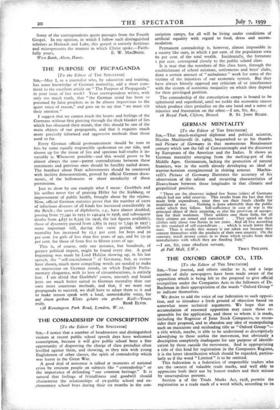THE COMRADESHIP OF CONSCRIPTION [To the Editor of THE SPECTATOR]
SIR,—I notice that a number of headmasters and distinguished visitors at recent public school speech days have welcomed conscription, because it will give public school boys a fine opportunity of disproving the charge of class prejudice often levelled against them, and showing, as they mix with young Englishmen of other classes, the spirit of comradeship which was learnt in the Great War.
A good deal of nonsense is talked at moments of national crisis by eminent people on subjects like " comradeship" or the importance of defending " our common heritage." It is natural that feelings of friendliness and goodwill should characterise the relationships of ex-public school and ex- elementary school boys during their six months in the con-
scription camps, for all will be living under conditions of artificial equality with regard to food, dress and accom- modation.
Permanent comradeship is, however, almost impossible in a society like ours, in which t per cent. of the population own 6o per cent. of the total wealth. Incidentally, the fortunate per cent. correspond closely to the public school class It is true that the members of this class have, through the establishment of school missions, settlements and boys' clubs, done a certain amount of " ambulance " work for some of the victims of the injustices of our economic system. But they have always bitterly opposed any criticism of or interference with the system of economic inequality on which they depend for their privileged position.
The comradeship of the conscription camps is bound to be ephemeral and superficial, until we tackle the economic causes which produce class prejudice on the one hand and a sense of injustice and frustration on the other.—I am, Sir, &c.,
16 Royal Park, Clifton, Bristol. R. ST. JOHN READE.










































 Previous page
Previous page